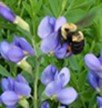
Trenholmk
Our group, Garden On, started in the spring of 2019. We had originally been tasked to upgrade the existing gardens. With the reconstruction of Shore Drive and the additional space to the church grounds, we will now have a rain garden!
Two members of our group, Carole Howe and Leo DaSilva, have a passionate interest in native plants and encouraged us to landscape with them. One of our goals is to share with you the advantages of native plants. The following is a question and answer format between Ruth Silver and Carole Howe.
R: Carole, would you briefly explain the difference between native and non-native plants?
C: Native plants naturally occur over thousands of years in specific regions of the world. They evolve to the local conditions, climate and wildlife. New England natives are plants that thrived here before the European settlements.
When the Europeans arrived, they brought their plants with them. These plants are called non-natives, also commonly called exotics or introduced natives.
R: Why are you advocating for native plants?
C: One of the most essential reasons is that they promote biodiversity.
Native plants co-evolved along with their native pollinators. For example, plants developed toxins to protect themselves from being eaten. Co-evolving insects developed immunity to the toxins. Both plants and pollinators evolved to increase the chance of being pollinated which leads to blooms which results in food. They do this by creating healthy ecosystems. Native plants support a greater insect diversity which is crucial for our food supply.
To be simplistic about it, natives belong here! And such is the interdependent web of life.
Next week: Natives do not require commercial fertilizers and pesticides!
A message from Carole’s sister Gail:
Hi,
Carole Howe’s sister Gail writing to you from beautiful Ontario where I have been living for over 15 years. During that time, I have worked to create fabulous native plant gardens where once there was barren lawn.
UUCW was an integral part of my childhood through adulthood and it pleases me immensely that our church is going native. What a fabulous opportunity to model beneficial lawn designs.
I have witnessed first hand the benefits of going native as I observe an increase in numbers and diversity of wildlife in my own urban yard. Plus, I find that native plants are much less demanding in their care and needs!
Do you have questions or comments? Send them to Garden On and we will answer them.
Garden On members: Betty Jenewin, Carole Howe, Leo DaSilva, Jan Cutman, Melissa McKeon, Kim McCoy and Ruth Silver
